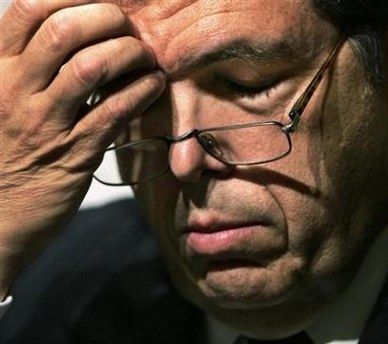Citigroup shares drop on mounting woes
Updated: 2007-11-06 10:07
NEW YORK -- Citigroup Inc's problems deepened on Monday as it was unable to assure investors that a potential $11 billion write-down for subprime mortgages won't grow, and its nearly pristine credit ratings were downgraded.
|
|
The largest US bank also reduced its previously reported third-quarter profit because of worsening credit markets, which it expects will reduce future cash flow. Moody's Investors Service and Fitch Ratings lowered Citigroup's debt ratings.
Its stock hit a new 4-1/2-year low.
"There's no way I think anyone can give you an assurance of how things are going to move," Chief Financial Officer Gary Crittenden said on a conference call. "We've taken what we think is a reasonable stab."
Citigroup's struggles came as it faced a leadership void, following the resignation of Chairman and Chief Executive Charles Prince on Sunday.
Prince left after a four-year tenure during which the bank's stock fell 17 percent amid criticism that Citigroup had grown unwieldy and lacked direction. Some investors want the bank, which has $2.35 trillion in assets, to be broken up.
Former US Treasury Secretary Robert Rubin, who led the bank's executive committee, was named chairman. Sir Win Bischoff, head of the European business, became acting chief executive.
Citigroup shares closed down $1.83, or 5 percent, at $35.90 on Monday on the New York Stock Exchange.
News of the expected write-down of $8 billion to $11 billion, equal to $5 billion to $7 billion after taxes, helped drag down shares of rivals Bank of America Corp (BAC.N), Goldman Sachs Group Inc (GS.N), Merrill Lynch & Co Inc (MER.N) and Morgan Stanley (MS.N).
Investors are worried that write-downs for subprime mortgages and other debt might not be isolated.
On October 15, Citigroup wrote off just $1.56 billion for its subprime portfolio for the third quarter, part of an overall $6.5 billion write-down. The bigger write-down reflects problems discovered since then.
Analysts said Merrill Lynch may add to its own announced $8.4 billion write-down. Merrill ousted its chief executive, Stanley O'Neal, last Tuesday.
"It shows the clumsiness of pricing mechanisms across Wall Street," said Michael Holland, a money manager and founder of Holland & Co in New York. He said it is difficult to value Citigroup "until the dust settles."
CREDIT DOWNGRADES
Moody's cut Citigroup's credit rating one notch to "Aa2," its third-highest rating, from "Aa1."
Fitch Ratings made a similar downgrade -- to "AA" from "AA-plus" -- citing "severe pressure" on capital markets operations and "an inhospitable consumer credit environment" as mortgage delinquencies soar.
Both agencies' rating outlooks are "negative," meaning further cuts are possible within two years.
Standard & Poor's said it also may downgrade Citigroup.
The yield on Citigroup's 6 percent notes maturing in 2017 rose to 1.51 percentage points above US Treasuries from 1.45, according to MarketAxess.
Saudi Prince Alwaleed bin Talal, Citigroup's largest individual investor, would not comment on the bank's problems until the "picture becomes clearer," spokeswoman Heba Fatani said.
Alwaleed endorsed bringing back Sanford "Sandy" Weill, who built Citigroup and hand-picked Prince to succeed him, to run the company on an interim basis, CNBC television said. Weill is not interested, but will do what is needed to help, CNBC said.
Weill owns about 16.6 million Citigroup shares, according to regulatory filings. The stake has lost more than $320 million in value this year.
Much of Citigroup's trouble is related to $43 billion of collateralized debt obligations (CDOs), which are linked to lower-quality mortgages.
While the "super-senior" securities were once considered rock-solid, CFO Crittenden said investors stopped buying them.
"No one is going to believe anybody any more" about CDOs, Howard Lutnick, CEO of Cantor Fitzgerald LP, which runs one of the world's largest bond brokerages, told the Reuters Finance Summit. "You have to run your own math."
Citigroup lowered third-quarter profit to $2.21 billion, or 44 cents per share, from the reported $2.38 billion, or 47 cents, after writing off $270 million for the CDO portfolio. The move brought the total quarterly write-down to $6.8 billion.
"There are no easy fixes for this very large and very complex organization," UBS analyst Glenn Schorr wrote.
RESTORING MORALE
As Citigroup tries to fix its problems, Rubin and Bischoff will seek to restore morale while hunting for a permanent chief executive.
Four directors, including Rubin and Time Warner Inc Chief Executive Richard Parsons, are conducting the search.
On a conference call, Rubin said he wants someone at Citigroup who can "relate ... to the multiplicity of businesses this institution has," and has a "strong international focus, not necessarily enormous international experience."
Citigroup operates in more than 100 countries and generates nearly one-half of its revenue internationally.
Based on Friday prices, Prince could leave with $31 million of stock and benefits, plus nearly $61 million of stock he owned, management consultant Hay Group estimated. Citigroup plans to disclose the exit package in a regulatory filing.
The bank declined to say when it will find a new chief executive. Possible candidates include NYSE Euronext chief John Thain, Crittenden, and Vikram Pandit, the investment banking, hedge fund and trading chief.
"I look forward to an interesting but relatively short period of months before handing over to the next CEO," Bischoff said.
|
|
|
||
|
||
|
|
|
|
